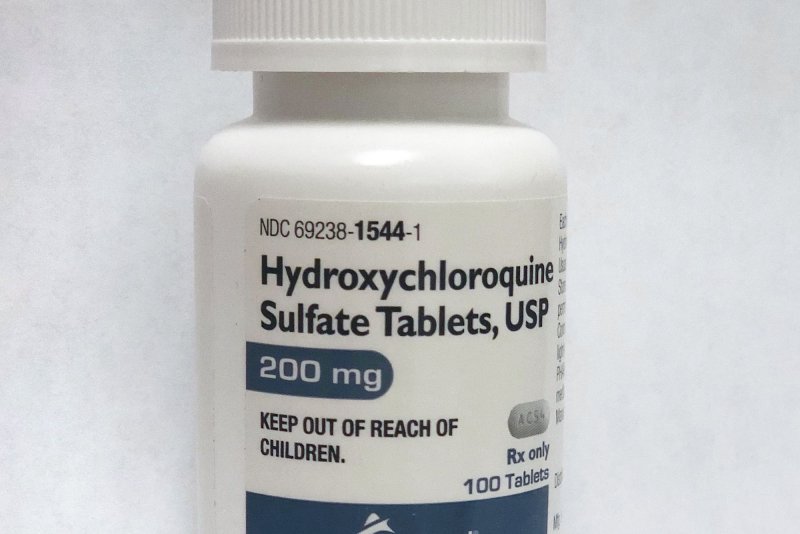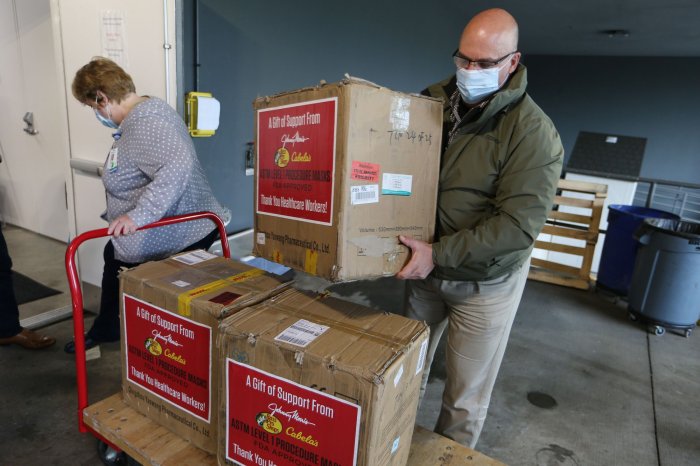New trials will explore whether hydroxychloroquine, which is used for lupus and arthritis, is an effective treatment for coronavirus. UPI Photo |
License Photo
NEW YORK, March 23 (UPI) -- New York, "ground zero" for the U.S. coronavirus outbreak, is taking the lead on drug testing, with trials beginning this week on three drugs believed to have potential for treatment.
Trials to assess the efficacy and safety of the anti-malaria drug chloroquine, its sister agent hydroxychloroquine and the antibiotic azithromycin will join trials of other drugs going on globally, including tests of an HIV drug and an antiviral.
No treatment so far has proven effective against COVID-19.
World Health Organization Director-General Tedros Adhanom Ghebreyesus told reporters Monday, "It's great to see the level of energy now being directed to research against COVID-19."
But he also cautioned against creating "false hope" and urged countries to work together on clinical trials so that they don't result in a "shortage of medications to treat other diseases."
New York has over half of the more than 35,000 confirmed cases of the virus in the United States. Gov. Andrew Cuomo said Sunday the state had purchased 750,000 doses of chloroquine, 70,000 doses of hydroxychloroquine and 10,000 doses of azithromycin for the trials, to be conducted by state health researchers.
New York's Department of Health will oversee two trials starting this week, one with a combination treatment of hydrochloroquine and azithromycin and another with plasma donated by COVID-19 patients who have recovered, a New York State DOH official told UPI.
The blood plasma trial will take longer to start, the official said, because recovered patients who are willing to make donations, and whose blood contains antibodies against the infection, will need to be identified before starting.
The U.S. Food and Drug Administration last week approved chloroquine and hydroxychloroquine, which is also used for lupus and arthritis, for clinical trials to treat coronavirus. Researchers in France have seen potential for the drugs when used in combination with azithromycin.
However, WHO officials have warned that chloroquine has many side effects and may be toxic at high doses. On Monday, health officials in Nigeria issued a warning over chloroquine, saying three people were hospitalized after overdosing on the drug.
WHO's SOLIDARITY trial, which also launches this week, will evaluate chloroquine, as well as the antiviral remdesivir, which was originally developed to treat Ebola.
China trials
Remdesivir is being studied in five large clinical trials. In Wuhan, China, where the coronavirus pandemic began, 761 patients are enrolled at multiple hospitals. Results are expected over the next few weeks.
Gilead, which makes remdesivir, announced Monday it would not be accepting new applications for emergency access to the drug -- which it has provided to several hundred patients in the United States, Europe, and Japan -- to ensure adequate supplies are available for trials.
In a study published last week by the New England Journal of Medicine, Chinese researchers found that the HIV drug lopinavir-ritonavir, which will also be part of the SOLIDARITY trial, offered no clinical benefit over standard care -- including supplemental oxygen, antibiotics and kidney support -- in 199 patients with COVID-19.
China's National Medical Products Administration has approved use of the antiviral medication favilavir to treat the virus, after a clinical trial involving 70 patients in Shenzhen, Guangdong province reportedly showed it was effective, with minimal side effects. Last week, a petition was launched on Change.org to free up the drug for use in the United States.
China has also approved the use of Roche's biologic anti-inflammatory drug tocilizumab for patients who develop severe complications from the coronavirus. Physicians there hope the drug can blunt the immune system response seen in some severe COVID-19 cases, which is believed to be the cause of catastrophic organ failure and death.
Other trials
Other researchers have been working to identify potential drug targets for COVID-19 treatments.
In a study published last week in the journal Science, the authors described how they have developed a "potent inhibitor" of the enzyme Mpro, which has been shown to play a role in the development of the virus.
In addition, another study, currently in press, researchers said they have investigated 26 of COVID-19's 29 genes and identified 332 "high confidence" human protein-protein interactions in the virus, as well as 66 "drug-gable" human proteins or host factors targeted by 69 existing FDA-approved drugs, drugs in clinical trials or pre-clinical compounds.
The potential drugs include antibiotics, as well as chloroquine.
Bass Pro Shops marketing manager David Smith (R) carries a box of donated face masks into Mercy Health in Chesterfield, Mo., on May 13. The company is donating 1 million FDA-approved ASTM Level 1 Procedure Face Masks to healthcare workers and first responders working on the front lines of the pandemic. Photo by Bill Greenblatt/UPI |
License Photo
















